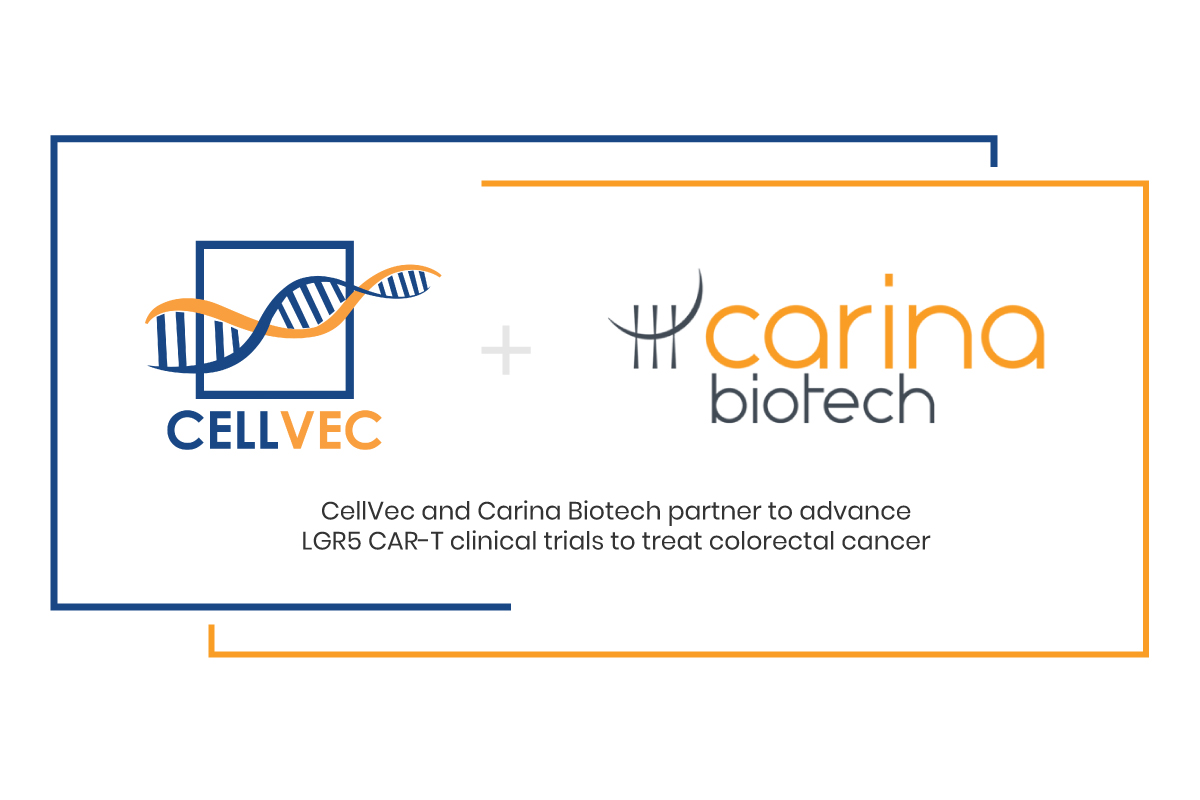SINGAPORE,10 November 2021–Singapore-based viral vector CDMO CellVec announces todaythat ithasbeen selected as the manufacturer of choicefor Australian cell therapy immuno-oncology company Carina Biotech, undertaking the production ofGMP-compliantlentivirus constructs for its LGR5 CAR-T.The partnership is slated to advance clinical trials for a treatment designed for patients with advanced colorectal (bowel) cancer.
CellVec is a certified GMP gene therapy contract development and manufacturing organisation that provides an advanced lentiviral vector platform to upscale production of viral vectors and develop novel gene transfer technologies to advance therapies to clinical application. Its strategic offering of bespoke manufacturing services will enable the clinical grade lentivirus to be produced under GMP standards while using Carina’s proprietary manufacturing process, progressing the production of LGR5 CAR-T cells for a first in-human clinical trial in H2 2022.
“The partnership with Carina Biotech marks a significant milestone for us to facilitate the furtherance of gene therapies. It attests to our capabilities to effectively scale bespoke viral vector manufacturing processes, enabling the advancement of different clinical therapies from bench to bedside that will benefit more patients across the world. We look forward to supporting Carina in the successful development of its LGR5 CAR-T cells,” said Dr Ang Peng Tiam, Chairman of CellVec and Medical Director of Parkway Cancer Centre, the largest private oncology service provider in the region.
“We are delighted to be working with CellVec because of their outstanding track record and expertise,” said Professor Simon Barry, VP of CAR-T Manufacturing Research and Development and the co-inventor of Carina’s lead CAR-T cell. “Their flexibility and willingness to incorporate Carina’s proprietary manufacturing process was an important consideration in the selection of CellVec as our service provider.
”Leveragingitsadvanced CellVec Vector Platform, CellVec’s efficacious manufacturing processes will scale the production of high-titre, high yield lentivirus constructs in an accelerated timeline (6 to 8 months)for the project. TheLGR5 CAR-T cell targetsthe LGR5 cancer stem cell markerthat is highly expressed on advanced colorectal cancer and some other cancers, resulting indurable tumour suppression and the prevention of relapses commonly seen in patients with colorectal cancer.
“We are continuing to see fantastic results with our LGR5 CAR-T cell in pre-clinical testing. Colorectal cancer is Australia’s second deadliest cancer and its incidence is rising in people under the age of 50 –with many of these people being diagnosed with advanced disease and a very poor prognosis,” said Dr Deborah Rathjen, CEO of Carina Biotech.
“After our recent successful capital raise and welcoming new impact investors to our company, we are on track for a pre-IND submission in Q2 of 2022 and an IND submission to the FDA in the second half of 2022 and the initiation of a Phase I/II clinical trial in patients with advanced colorectal cancer.
”Commenting on the potential of the partnership, Dr Gayatri Sharma, Chief Commercial Officer of CellVec said, “Carina’s work in LGR5 CAR-Ttherapy aligns strongly with our mission of innovating for patient benefit. Our manufacture of the required lentivirus constructs will accelerate the clinical application and adoption of the therapy, bringing it to more patients around the world and ultimately reduce the incidence and mortality of colorectal cancer.We are pleased to be part of this journeywithCarinaandare extremely excited for what this will bring to the colorectal cancer community.
”CellVec boasts a GMP-certified pharmaceutical quality system (PQS) and facility, awarded by the Health Sciences Authority of Singapore under current PIC/S guidance annexes for medicinal products. These are designed in alignment with US FDA, EU GMP and TGA (Australia) regulations and industry expectations. With a strategic location in Singapore, the region’s biotech hub, CellVec is able to facilitate on-time delivery of qualityviral vectors across the world, including to the US and the UK.
-ENDS–
About CellVec
CellVec is the first CDMO in Southeast Asia GMP-certified for the production of viral vectors for gene therapy as an active pharmaceutical ingredient. Its manufacturing facility is built to comply with PIC/S, US FDA and EU GMP specifications for viral vectors, upholding quality standards of viral vector production. Specialising in lentiviral vectors, CellVec is a specialist provider of custom viral vectors for pre-clinical and clinical applications. In its commitment towards innovating for patient benefit, CellVec also offers end-to-end project management support to see therapeutics ideas from bench to bedside. For more information, visit www.cellvec.com.
About Carina Biotech
Adelaide-based Carina Biotech is developing CAR-T and other adoptive cell therapies for the treatment of solid cancers. As well as its LGR5-targeted CAR-T cell for advanced colorectal cancer, Carina has a deep pipeline of CAR-T programs.
Using its proprietary chemokine receptor platform, Carina aims to improve access to and infiltration of solid cancers by CAR-containing cells –resulting in more potent and specific cancer killing and reduced off-target effects in a number of cancers.
Carina also has a fully integrated, proprietary manufacturing process that has both reduced manufacturing time and improved CAR-T cell quality, capable of delivering robust “serial-killing” CAR-T cells to patients.
About LGR5
LGR5 is a cancer stem cell markerthat is highly expressed on advanced colorectal cancer and some other cancers. In colorectal cancer patients,LGR5+ expression has been correlated with a particularly poor prognosis.
Cancer stem cells are a small sub-population of cells within a tumour with the ability to self-renew, differentiateinto the many cell types of a tumour, initiatenew tumours, and resistchemotherapy and radiotherapy (leading to relapses).
By targeting cancer stem cells, it is hoped that this therapy will reduce the tumour’s ability to generate new cancer cells, resulting in durable tumour suppression and preventing the relapses that are very common in patients with colorectal cancer.
Carina’s pre-clinical studies of the LGR5-targeted CAR-T cell have shown highly promising results with complete tumour regression and no tumour recurrence. They have also demonstrated impressive tumour access and prolonged CAR-T cell survival.
For media enquiries via Redhill:
Victoria Mak Daphne Quek
+65 9173 3801 +65 9836 6993
victoria.mak@redhill.asia daphne.quek@redhill.asia

